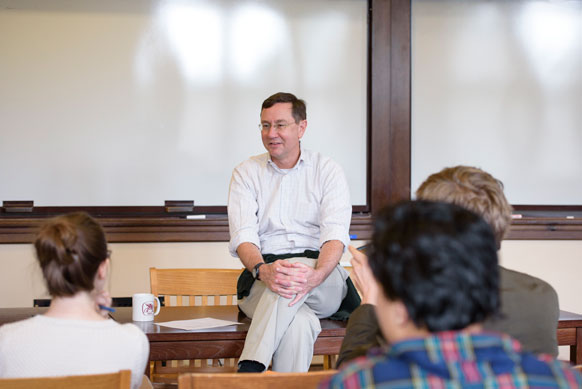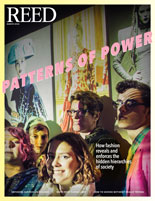
IRIS login | Reed College home Volume 95, No. 1: March 2016
What is a Successful College Education? (continued)

Photo by Nina Johnson
Positive Experiences
The third element of a successful education is often overlooked, and that is rich and positive personal experiences. These are experiences that we value as humans not because they have some instrumental purpose, that we can employ to our benefit later in life, but things that are good in themselves in the moment. College is a huge percentage of your kid’s life. They are going to spend four, maybe five, years here. That’s at least five percent of their entire life, if they are fortunate enough to live to age eighty. It is even more, when viewed from the students’ perspective. College will be a third of their conscious life to date! For this reason, it is important that their days be filled with rich experiences that are valuable in themselves.
What kind of things really matter? You can make your own list. Learning to have a healthy relationship with yourself and with other people. Making friends. Falling in love. Getting your heart broken. Learning how to get in and out of a relationship responsibly and ethically. Playing a sport. Trying something athletic or artistic you’ve never tried. If you’ve never skied, try skiing. If you’ve never rock climbed, go rock climbing. If you’ve never gone hiking before, go hiking. Travel overseas. Act in a play. Paint a landscape. Play the mandolin. Operate a nuclear reactor. Do things that are fun, that are rewarding, that offer pleasure and satisfy curiosity.
I hope all of your students have one positive experience that is unique to college—the chance to fall in love with an intellectual discipline. I would encourage students and their parents not to think about this decision instrumentally. Students should not major in a field because they imagine it will be useful. They should major in a subject they love. This is in part because you’re more likely to work hard at something you enjoy. But I also believe that in life, people who have the courage to do what they love ultimately have the most success. That’s why I think it’s so important to get students into the habit of taking a risk and doing what they love, not what they think is safe.
Self-Definition
Fourth, college students have to learn to define themselves in the world. As you know, teenagers are highly impressionable. They arrive at college with an amorphous and plastic sense of self that has been shaped heavily to date by their families, their high schools, their peers, the media, and the internet.
It is critical, during the years from 18 to 22, that students begin to evolve into adults with their own sets of values, beliefs, and style—ones that they have chosen for themselves, not ones that have been inherited or received from others. They need to take time when they’re in college to think about what’s truly important to them. Do they believe in God? What kind of God? If they don’t believe in God, what provides the foundation of their values? What are the values that they want to pursue and espouse for the rest of their lives? What aesthetic and personal style do they want to present to the outside world? If they fail to ask and answer these questions, as least provisionally, they will be societally programmed robots, not human beings.
This self-definition—the moment a young person says, “I’m going to be a human being who cares about this set of things, and who chooses to live in this manner,” is important and powerful. There is not, however, much social discourse about it. That is one of the things that makes a liberal arts education so important. The texts that students read in Hum 110 require them to think critically about the values of classical society and, more importantly, about how their own personal values relate to those of others. The class requires them to engage intellectually over fundamental questions of aesthetic, ethical, and political values with peers who come from radically different backgrounds. That ability to listen to other people, to think about what they believe, to compare that to their own values, and then potentially to modify their own beliefs because of these interactions with others, is something only a great college education can instill. And if that education is successful, your students will emerge with a set of values and a sense of self that is uniquely and truly theirs.
Preparing for the Future
Finally, a successful college education should help students build for the future. A place like Reed should be like a trampoline. You jump on it, and there’s a little bit of resistance, and it’s difficult. After four years, however, it should blow you out into orbit with a sense of power to live a life of meaning and purpose.
There’s a lot of talk in America about how college should prepare you for your first job. This seems incredibly short-sighted to me. College should not prepare you for your first job, but for the rest of your life.
I would prefer us to take one step back and to ask students to do more than just find a job. I want them to identify, while they are in college, the kind of life of meaning and purpose that they would like to pursue. This requires more than seeking employment. It forces them to identify a long-term professional trajectory that will offer them the kinds of rewards and experiences they desire. We are going to spend a lot of our lives working. So, students should ask themselves: What kind of work will sustain me? What kind of rewards do I want? What kind of financial, personal, and societal goals will give my life value?
Thinking creatively about the future is not enough. Students need to take some proactive steps to prepare for life after Reed as well. Let me suggest that students should leave Reed with four interesting things on their résumé that they can talk about when applying for work. These might include a compelling summer job or internship, a particular academic distinction, or a valuable skill like the ability to write code or speak a foreign language. You want to leave Reed with four things that you can talk about. As long as you pile up one of those things a year, you’re doing fine.
So that concludes my sermon. I have given this topic a great deal of thought, but I don’t want to suggest that this is the only way to define success. You may have other goals in mind for your student—and they may have goals that are radically different from yours. I am certain, however, that the students who take the time to identify goals are the ones who get the most out of their education—and, like Aristotle’s archers, the ones most likely to hit their targets.
- Previous Page
- 1
- 2
- Next Page

LATEST COMMENTS
steve-jobs-1976 I knew Steve Jobs when he was on the second floor of Quincy. (Fall...
Utnapishtim - 2 weeks ago
Prof. Mason Drukman [political science 1964–70] This is gold, pure gold. God bless, Prof. Drukman.
puredog - 1 month ago
virginia-davis-1965 Such a good friend & compatriot in the day of Satyricon...
czarchasm - 4 months ago
John Peara Baba 1990 John died of a broken heart from losing his mom and then his...
kodachrome - 7 months ago
Carol Sawyer 1962 Who wrote this obit? I'm writing something about Carol Sawyer...
MsLaurie Pepper - 8 months ago
William W. Wissman MAT 1969 ...and THREE sisters. Sabra, the oldest, Mary, the middle, and...
riclf - 10 months ago